German actress Lisa Weise (?-1952) starred in silent films of the 1910s. Most of her films were directed by Friedrich Zelnik and her film partner was often Karl Beckersachs.
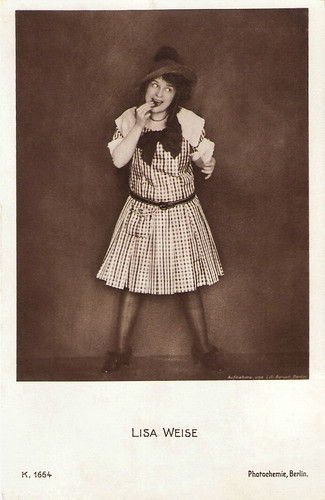
German postcard by Photochemie, Berlin, no. K.1664. Photo: Lili Baruch, Berlin.
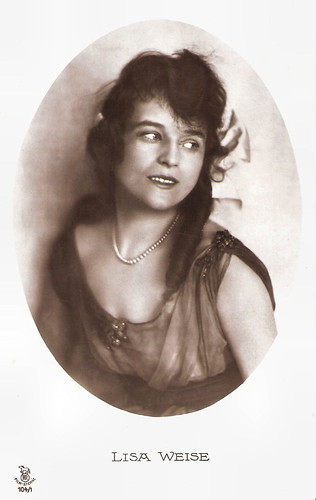
German postcard by Rotophot in the Film-Sterne series, no. 104/1.
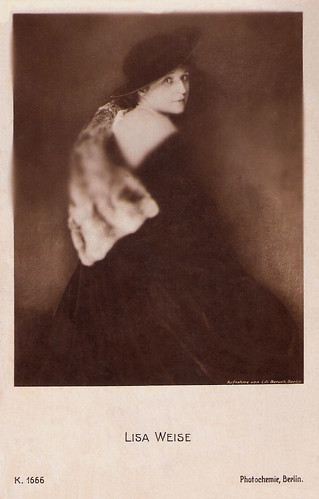
German postcard by Photochemie, Berlin, no. K.1666. Photo: Lili Baruch, Berlin.
Little is known about Lisa Weise. Unknown is for instance when and where she was born.
According to Thomas Staedeli at Cyranos, she made her film debut in Der Graf von Luxemburg/The Count of Luxembourg (1910), but before that she must have worked in the theatre.
She returned to the stage and in 1912 she parodied the silent film in the ‘Posse mit Gesang’ (a kind of popular musical drama) Filmzauber (Film Magic) by Walter Kollo and Willy Bredschneider, with a German libretto by Rudolf Bernauer and Rudolf Schanzer. Her co-star was the celebrated Austrian singer and later film actor, Oscar Sabo.
Filmzauber is a farce, with a number of subplots, centring on the efforts by the idolized silent film producer-actor Adalbert Musenfett to cast himself as Napoleon in a drama set during the Battle of Leipzig. Maria Gesticulata, an Italian tragedienne, is lined up to play his love interest, the pretty Knötteritz tobacco-miller's daughter.
An English version of the farce, The Girl on the Film, translated and adapted by James T. Tanner with additional music by Albert Szirmai, premiered in London in 1913 and was later performed in New York and elsewhere.
In 1915, after an interruption of five years, Weise stood again for the camera and enjoyed a brief film career. Her second film was the silent drama Carl und Carla/Carl and Carla (Carl Wilhelm, 1915), with Karl Beckersachs. Weise starred as both Carl and Carla in this Decla-Bioscop AG production. Her next film was Fräulein Wildfang/Miss Wildfang (1916).
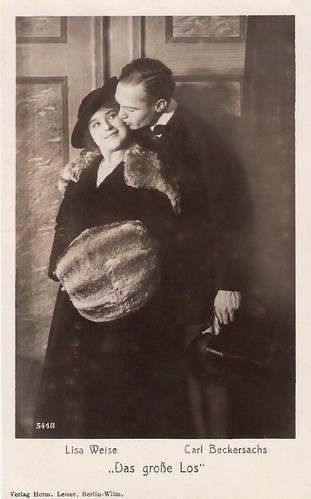
German postcard by Verlag Hermann Leiser, Berlin-Wilm., no. 5448. Photo: publicity still for Das grosse Los/The big prize (Friedrich Zelnik, 1917) with Karl Beckersachs.
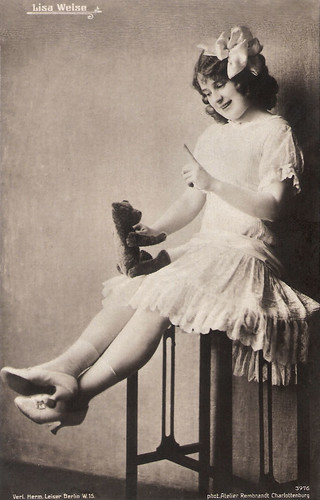
German postcard by Verlag Hermann Leiser, Berlin Wilm., no. 3976. Photo: Rembrandt, Charlottenburg.
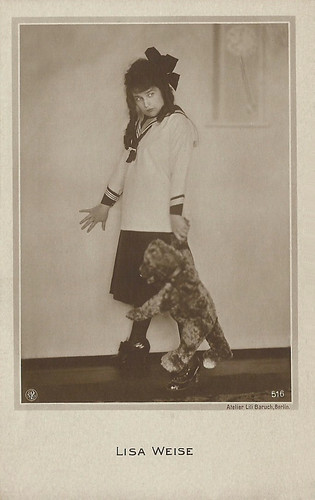
German postcard by NPG, no. 516. Photo: Lili Baruch, Berlin. Collection: Didier Hanson.
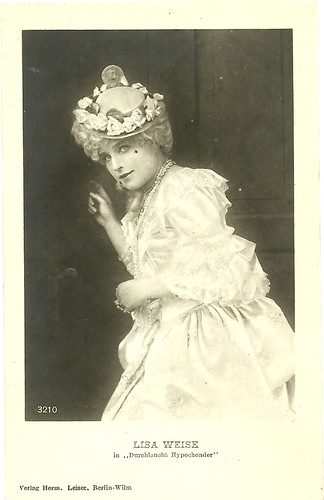
German postcard by Verlag Hermann Leiser, Berlin-Wilm., no. 3210. Photo: publicity still for Durchlaucht Hypochonder/Highness hypochondriac (Friedrich Zelnik, 1918). Collection: Didier Hanson.
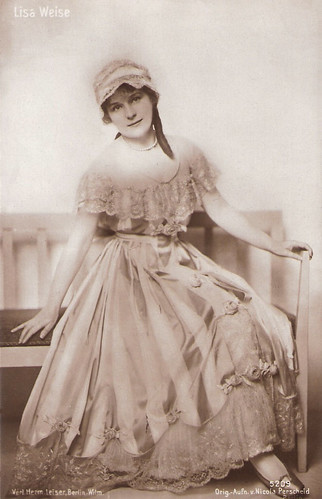
German postcard by Verlag Hermann Leiser, Berlin Wilm., no. 5209. Photo: Nicola Perscheid.
Lisa Weise co-starred with Karl Beckersachs again in Ein Zirkusmädel/A circus girl (Carl Wilhelm, 1917).
Producer of the film was Friedrich Zelnik, later known as Frederic Zelnik. Zelnik himself directed Das große Los/The big prize (Friedrich Zelnik, 1917) again with Weise and Beckersachs.
That year Weise also starred in the title role of Klein Doortje/Little Dorrit (Friedrich Zelnik, 1917), an adaptation of Little Dorrit by Charles Dickens. In the cast were also Karl Beckersachs and Grete Weixler.
Furthermore, Lisa Weise made Edelweiß (Friedrich Zelnik, 1917), co-starring with Beckersachs and the future director Lupu Pick.
Lisa Weise made thee more films for the Berliner Film Manufaktur in 1918. The first was Gänseliesel/Liesel of the Geese (Friedrich Zelnik, 1918).
She played the title role in Durchlaucht Hypochonder/Highness hypochondriac (Friedrich Zelnik, 1918) with Karl Beckersachs and Curt Vespermann. The script was written by Ewald André Dupont.
Her final film, according to IMDb was Der Liftjunge/The elevator boy (1918), of which the director is unknown. Staedeli also mentions Amalie - 45 Mark (1918).
After that Lisa Weise retired and he vanished into obscurity. Completely forgotten by the public she died in 1952.
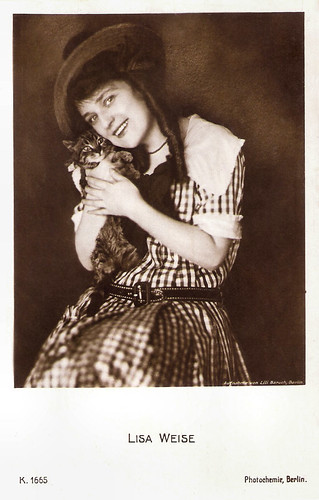
German postcard by Photochemie, Berlin, no. K.1665. Photo: Lili Baruch, Berlin.
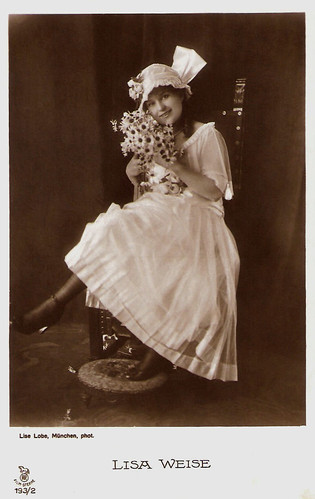
German postcard by Rotophot in the Film Sterne series, no. 193/2. Photo: Lise Lobe, München.
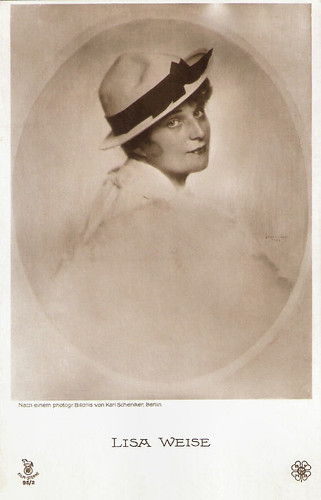
German postcard by Rotophot in the Film-Sterne series, no. 95/2. Photo: Karl Schenker, Berlin / BFWMB.
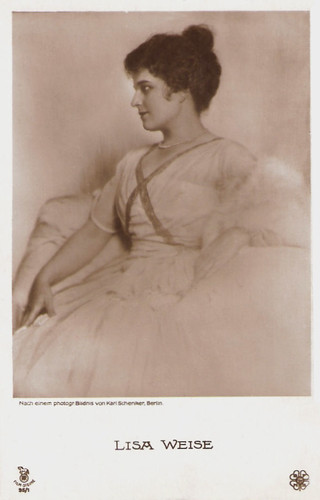
German postcard by Rotophot in the Film Sterne series, no. 95/1. Photo: Karl Schenker, Berlin / NFMB.
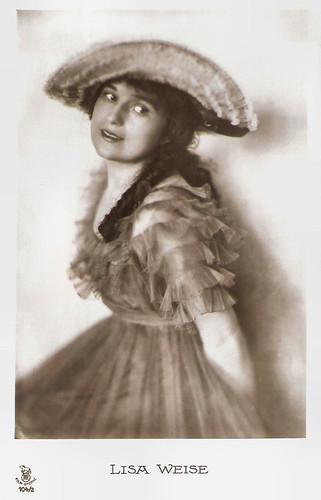
German postcard by Rotophot in the Film-Sterne series, no. 104/2.
Sources: Thomas Staedeli (Cyranos), Wikipedia and IMDb.

German postcard by Photochemie, Berlin, no. K.1664. Photo: Lili Baruch, Berlin.

German postcard by Rotophot in the Film-Sterne series, no. 104/1.

German postcard by Photochemie, Berlin, no. K.1666. Photo: Lili Baruch, Berlin.
Film Magic
Little is known about Lisa Weise. Unknown is for instance when and where she was born.
According to Thomas Staedeli at Cyranos, she made her film debut in Der Graf von Luxemburg/The Count of Luxembourg (1910), but before that she must have worked in the theatre.
She returned to the stage and in 1912 she parodied the silent film in the ‘Posse mit Gesang’ (a kind of popular musical drama) Filmzauber (Film Magic) by Walter Kollo and Willy Bredschneider, with a German libretto by Rudolf Bernauer and Rudolf Schanzer. Her co-star was the celebrated Austrian singer and later film actor, Oscar Sabo.
Filmzauber is a farce, with a number of subplots, centring on the efforts by the idolized silent film producer-actor Adalbert Musenfett to cast himself as Napoleon in a drama set during the Battle of Leipzig. Maria Gesticulata, an Italian tragedienne, is lined up to play his love interest, the pretty Knötteritz tobacco-miller's daughter.
An English version of the farce, The Girl on the Film, translated and adapted by James T. Tanner with additional music by Albert Szirmai, premiered in London in 1913 and was later performed in New York and elsewhere.
In 1915, after an interruption of five years, Weise stood again for the camera and enjoyed a brief film career. Her second film was the silent drama Carl und Carla/Carl and Carla (Carl Wilhelm, 1915), with Karl Beckersachs. Weise starred as both Carl and Carla in this Decla-Bioscop AG production. Her next film was Fräulein Wildfang/Miss Wildfang (1916).

German postcard by Verlag Hermann Leiser, Berlin-Wilm., no. 5448. Photo: publicity still for Das grosse Los/The big prize (Friedrich Zelnik, 1917) with Karl Beckersachs.

German postcard by Verlag Hermann Leiser, Berlin Wilm., no. 3976. Photo: Rembrandt, Charlottenburg.

German postcard by NPG, no. 516. Photo: Lili Baruch, Berlin. Collection: Didier Hanson.

German postcard by Verlag Hermann Leiser, Berlin-Wilm., no. 3210. Photo: publicity still for Durchlaucht Hypochonder/Highness hypochondriac (Friedrich Zelnik, 1918). Collection: Didier Hanson.

German postcard by Verlag Hermann Leiser, Berlin Wilm., no. 5209. Photo: Nicola Perscheid.
A Circus Girl
Lisa Weise co-starred with Karl Beckersachs again in Ein Zirkusmädel/A circus girl (Carl Wilhelm, 1917).
Producer of the film was Friedrich Zelnik, later known as Frederic Zelnik. Zelnik himself directed Das große Los/The big prize (Friedrich Zelnik, 1917) again with Weise and Beckersachs.
That year Weise also starred in the title role of Klein Doortje/Little Dorrit (Friedrich Zelnik, 1917), an adaptation of Little Dorrit by Charles Dickens. In the cast were also Karl Beckersachs and Grete Weixler.
Furthermore, Lisa Weise made Edelweiß (Friedrich Zelnik, 1917), co-starring with Beckersachs and the future director Lupu Pick.
Lisa Weise made thee more films for the Berliner Film Manufaktur in 1918. The first was Gänseliesel/Liesel of the Geese (Friedrich Zelnik, 1918).
She played the title role in Durchlaucht Hypochonder/Highness hypochondriac (Friedrich Zelnik, 1918) with Karl Beckersachs and Curt Vespermann. The script was written by Ewald André Dupont.
Her final film, according to IMDb was Der Liftjunge/The elevator boy (1918), of which the director is unknown. Staedeli also mentions Amalie - 45 Mark (1918).
After that Lisa Weise retired and he vanished into obscurity. Completely forgotten by the public she died in 1952.

German postcard by Photochemie, Berlin, no. K.1665. Photo: Lili Baruch, Berlin.

German postcard by Rotophot in the Film Sterne series, no. 193/2. Photo: Lise Lobe, München.

German postcard by Rotophot in the Film-Sterne series, no. 95/2. Photo: Karl Schenker, Berlin / BFWMB.

German postcard by Rotophot in the Film Sterne series, no. 95/1. Photo: Karl Schenker, Berlin / NFMB.

German postcard by Rotophot in the Film-Sterne series, no. 104/2.
Sources: Thomas Staedeli (Cyranos), Wikipedia and IMDb.
No comments:
Post a Comment